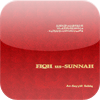[iPhone God App] It was found using the Fiqh-us-Sunnah actually
This application provides the english translation of the book Fiqh-us-Sunnah Volume 1.
Fiqh-us-Sunnah was written by Sayyid Saabiq (1915-2000 C.E.), may Allaah have mercy on him. The following information is taken from his obituary in the March 2, 2000 Daily News of IANA Radionet.
"...Sabiq's most famous book was the three-volume Fiqh As-Sunnah, which in the first writing of its kind brought the four major madhahib together, in a comprehensive treatment of Fiqh matters. The book has since been translated into dozens of languages and is used by Muslims throughout the world. Sabiq wrote Fiqh As-Sunnah in the 1940s when he was only 30 years old. He wrote the book at the request of Ustadh Hassan al-Banna, the founder of the Muslim Brotherhood. Every Fiqh ruling in the book goes back to the Qur'an and Sunnah and Sabiq dealt with all four madhahib objectively, with no preferential treatment to any. Sabiq also wrote the book, "Islamic Theology," along the same lines: simplification and avoidance of overphilosophization or getting involved in disputes on arcane topics. Besides his academic work, Sabiq was a noted Islamic activist. After writing Fiqh As-Sunnah, Sabiq spent some time fighting along with the Mujahideen in Palestine in the late 1940's and he later visited most countries in the world and lectured in their mosques. He was the first graduate of Azhar to visit the Soviet Union and check on the conditions of Muslims there. Sabiq was born in 1915 in the Egyptian village, Istanha. He received his education at Al-Azhar and after his graduation worked as the Director of Mosques and Islamic Education in the Egyptian Islamic Affairs Ministry. He also taught at Al-Azhar, and later moved to Saudi Arabia, where he headed the Shari'a Graduate Studies Department in Um Al-Qura University. After moving back to Egypt, he spent years teaching students in a Mosque in Cairo..."
In the early 1990's, Fiqh-us-Sunnah was translated into English by a group of people commissioned by American Trust Publications. The translators included Muhammad Sa'eed Dabas, Jamal al-Din M. Zarabozo, Abdul-Majid Khokhar, and M. S. Kayani. This group published Fiqh-us-Sunnah in five volumes which form the basis for this online edition. MSA-USC obtained the "raw" electronic data from the Al Muhaddith project, and converted this data into Web-ready format. A similar effort may be found at Islamic Resources Repository (IRR) by the DEED group at the International Islamic University, Malaysia.
Fiqh-us-Sunnah was written by Sayyid Saabiq (1915-2000 C.E.), may Allaah have mercy on him. The following information is taken from his obituary in the March 2, 2000 Daily News of IANA Radionet.
"...Sabiq's most famous book was the three-volume Fiqh As-Sunnah, which in the first writing of its kind brought the four major madhahib together, in a comprehensive treatment of Fiqh matters. The book has since been translated into dozens of languages and is used by Muslims throughout the world. Sabiq wrote Fiqh As-Sunnah in the 1940s when he was only 30 years old. He wrote the book at the request of Ustadh Hassan al-Banna, the founder of the Muslim Brotherhood. Every Fiqh ruling in the book goes back to the Qur'an and Sunnah and Sabiq dealt with all four madhahib objectively, with no preferential treatment to any. Sabiq also wrote the book, "Islamic Theology," along the same lines: simplification and avoidance of overphilosophization or getting involved in disputes on arcane topics. Besides his academic work, Sabiq was a noted Islamic activist. After writing Fiqh As-Sunnah, Sabiq spent some time fighting along with the Mujahideen in Palestine in the late 1940's and he later visited most countries in the world and lectured in their mosques. He was the first graduate of Azhar to visit the Soviet Union and check on the conditions of Muslims there. Sabiq was born in 1915 in the Egyptian village, Istanha. He received his education at Al-Azhar and after his graduation worked as the Director of Mosques and Islamic Education in the Egyptian Islamic Affairs Ministry. He also taught at Al-Azhar, and later moved to Saudi Arabia, where he headed the Shari'a Graduate Studies Department in Um Al-Qura University. After moving back to Egypt, he spent years teaching students in a Mosque in Cairo..."
In the early 1990's, Fiqh-us-Sunnah was translated into English by a group of people commissioned by American Trust Publications. The translators included Muhammad Sa'eed Dabas, Jamal al-Din M. Zarabozo, Abdul-Majid Khokhar, and M. S. Kayani. This group published Fiqh-us-Sunnah in five volumes which form the basis for this online edition. MSA-USC obtained the "raw" electronic data from the Al Muhaddith project, and converted this data into Web-ready format. A similar effort may be found at Islamic Resources Repository (IRR) by the DEED group at the International Islamic University, Malaysia.
- Children's Stories
- Stories of Sahaba
- Kid's Bedtime Stories
- Hadith Sahih Al-Bukhari ( Quran Hadeeth Islam )
- Sahih Al-MuslimEnglish Translation
- Beautiful Sayings of Prophet Muhammad (PBUH)Islam Quran and Hadith Awareness Program
- Seerat-un-Nabi
- Flashlight , Night Lamp & Clock
- 8 Islamic Books ( Islam Quran Hadith )
- Bautiful Sayings of Prophet Muhammad (PBUH)Quran, Hadith, Islam Awareness Program
- Alarm Security System DELUXE Version for iPhone & iPod Touch
- Irfan Farooqi
Ranking chart
This app is not in the rankings recently
Fiqh-us-Sunnah evaluation and reputation and reviews, reviews summary
- GOOD!!
- Usually?
Reviews Wanted! ! Let's write that it was found by using the Fiqh-us-Sunnah

